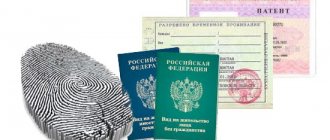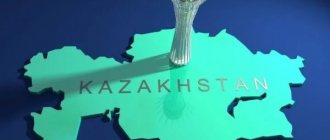- home
- Services
- Civil cases
- Grounds for lifting the ban on entry into Russia
Lifting the ban on entry into Russia gives a foreigner the right to enter the country legally. If a person lives in a country with which Russia does not have an agreement on a visa-free regime, then entry will require, in addition to lifting the ban, a visa. If the state from which the foreigner is from has a valid agreement with Russia on a visa-free regime, then a visa is not needed to enter the country.
Are travel bans and deportations different concepts? What is the difference?
An entry ban, or refusal to enter the Russian Federation, is a type of restriction in which a foreign citizen is prohibited from entering the Russian Federation for a certain period (3, 5, 10 years or indefinitely). Today, this is the most common problem among foreign citizens, since it is very easy to “earn” a ban on entry into Russia - it is imposed for minor offenses, lack of registration, traffic police fines, violation of the terms of stay... There are many reasons.
An entry ban is often called deportation or a blacklist. This is wrong. Deportation is the expulsion of a foreign citizen if he does not have legal grounds to be in Russia. It can be carried out even when there is no entry ban. Deportation is also applied if a decision is made regarding a foreigner not to allow entry into the Russian Federation, or a decision on the undesirability of staying (residence) in the Russian Federation.
Foreigners are most often banned from entering Russia for violating the period of temporary stay and for committing administrative offenses . Decisions on deportation are usually made after the release of a foreign citizen from prison - if a decision is made regarding the foreigner that it is undesirable to stay in the Russian Federation.
What objects may be affected by this measure of influence?
Immovable things (according to clause 1 of Article 130 of the Civil Code of the Russian Federation) are plots of land, subsoil and all things firmly connected to the land that cannot be moved without disproportionate damage to their purpose (buildings, structures, unfinished construction objects).
This also includes aircraft and inland navigation vessels that are subject to state registration. The law may classify other property as real estate.
This also includes residential and non-residential premises, as well as parking spaces, if the boundaries of such premises, parts of buildings, structures are described in the manner established by the legislation on state cadastral registration. In this way, it is possible to establish a ban on the sale of the property indicated above.
Which government agencies ban a foreign citizen from entering? And who makes decisions on deportation?
A decision on an entry ban (undesirability of staying in the Russian Federation) can be made by the Directorate for Migration Issues of the Russian Ministry of Internal Affairs , which happens most often. Similar decisions can also be made by:
- Ministry of Internal Affairs;
- Ministry of Justice;
- Rospotrebnadzor;
- Federal Security Service.
Decisions on deportation are made only by migration authorities - the Directorate for Migration Issues of the Ministry of Internal Affairs of the Russian Federation.
Who can restrict or ban state registration and for what?
The list of authorities is presented in the Order of the Ministry of Internal Affairs “On the procedure for registering vehicles” (N1001 dated November 24, 2008). Among other things, it says that a ban or restriction may be imposed:
- by a court order (for non-payment of taxes, late payment of traffic police fines, debts to utility or credit organizations, as well as during the division of property);
- investigative authorities (if the car is wanted);
- Traffic police (if external discrepancies are detected in the car with the characteristics specified in the technical passport);
- social protection authorities;
- customs representatives (in case of violations of import rules or indication of false information about the vehicle);
- other bodies vested with the necessary powers.
How do foreigners find out about the ban on entry into Russia? Are they informed about this in advance?
State bodies make a decision on an entry ban in absentia. That is, no one will call the migrant and warn him about this; he does not need to be present in person, put any signatures, or explain himself.
Foreigners may not even suspect that entry into the Russian Federation is closed to them for the coming years.
In most cases, people find out about the entry ban at the border when they try to get into Russia. Imagine, a person leaves the Russian Federation, for example, on vacation, to visit relatives or on business, and when he tries to return back, the border guards inform him that he has an entry ban and is not allowed to go beyond the border. As a result, you have to return to your home state and resolve the issue from there.
A “surprise” can also await foreigners when applying for a patent, temporary residence permit, residence permit, or citizenship. A person submits documents, waits, for example, for a temporary residence permit to be ready, but he receives a refusal, since it turns out that he has an entry ban.
In general, the government body that decided to restrict entry into Russia is obliged to send a corresponding notification to the foreign citizen .
This is what a notification about a ban on entry into Russia looks like
But such letters do not always reach the addressee , and to be more precise, they almost never reach the recipient. There are several reasons for this: a foreigner may not live at the place of registration, as is often the case, and the government agencies themselves may “forget” to take the notification to the post office.
If you can’t count on notifications, then how can you check whether there is a ban on entry into the Russian Federation?
A foreigner can independently check whether there is a ban on entry into the Russian Federation or not. It will be especially useful to do this before traveling abroad or submitting documents for a temporary residence permit or residence permit . There are several options:
- The fastest, but not very reliable, is checking the entry ban online through the Ministry of Internal Affairs website. There is a special service on the official website of the Main Directorate for Migration of the Ministry of Internal Affairs of Russia. A citizen just needs to enter his full name, passport details (which he used to enter Russia) and the system will provide information about the presence or absence of an entry ban. Why is this option unreliable? The site itself warns that the data is for reference purposes only. In addition, sometimes the service malfunctions and may provide incorrect information or not provide data at all. Follow the link for instructions on how to check an entry ban through the Ministry of Internal Affairs website.
- A more reliable option is to send a request through the official website of the Ministry of Internal Affairs of the Russian Federation (a service for receiving applications from citizens and organizations). In your free form request, ask for information about the existence of an entry ban. Within 30 days you will receive an official response from the Ministry of Internal Affairs. You can send a request both from the territory of the Russian Federation and from another state. For instructions, see the article on submitting requests through the Ministry of Internal Affairs website.
- Personal visit to the migration department of the Ministry of Internal Affairs. If you are in Russia, you can come to the territorial office of the Ministry of Internal Affairs at your place of registration and find out about the existence of an entry ban.
Use a secure payment system
When you go to the online payment page, look for the logos of the MasterCard SecureCode, Visa Secure and Mir Accept programs. All these programs, using 3D-Secure technology, additionally protect you when shopping online.
If the online store supports this technology, then after entering the details it should redirect to the bank’s secure Internet page. And to confirm the purchase, you will need to enter the code from SMS, which will be sent to the phone number linked to the card.
And if it is already known that there is an entry ban, but it is not clear for how long. How can I find out the details?
The entry ban can be set for 3, 5, 10 years, or indefinitely. To find out the period, you need to find out under what article and on the basis of what law the ban was established. This can be done in several ways.
If you received a notice , it will indicate the provision of law on the basis of which the decision to deny entry was made. It will be enough to open the law and read the article according to which you were banned from appearing in Russia.
The notification indicates the basis on which entry into the Russian Federation is prohibited
If you do not have a notification , then you can submit an application to the migration authorities. In a free-form application, the foreigner asks for clarification of who, on what grounds and for what period of time made the decision to deny entry. The application can be submitted through the official website of the Ministry of Internal Affairs, during a personal visit to the migration department of the Ministry of Internal Affairs, or sent by mail .
“Please provide information about whether a restriction in the form of a refusal to enter was applied to me. If it was applied, please inform me on the basis of what regulatory act I was banned from entering the Russian Federation, until what date the ban is valid (day, month, year), which government body imposed it,”
- an example of a call.
If the news of a denial of entry permission caught you while you were abroad your representative , can obtain information about the details of the ban . But in this case, it is usually necessary to draw up a power of attorney from a notary. Or you can entrust this matter to a lawyer who deals with issues of lifting the entry ban.
What is the procedure for imposing restrictions?
Restrictions on the disposal of property are established by the FSSP. The service does this on its own initiative as part of enforcement proceedings for debt collection. Or on the basis of a relevant judicial act when considering one of the above cases.
The bailiff arrests the debtor's vehicle with the obligatory participation of witnesses and with the preparation of a corresponding act (inventory of property).
The description must indicate:
- data of persons present at the arrest;
- name (make) of the car and its preliminary assessment;
- type, volume and period of restriction of the right to use property;
- a note of seizure, or data of the person to whom the car was transferred for safekeeping.
What does a foreigner need to do to be banned from entering Russia?
Fines are a common reason for a ban on entry into the Russian Federation, photo: gorod-kamyshlov.ru
There are many things for which you can receive such a restriction. The law includes about 20 grounds. All of them are specified in Articles 26 and 27 of Federal Law No. 114 “On the procedure for leaving the Russian Federation and entering the Russian Federation .
But in 80 - 90% of cases, migrants get into trouble entering the Russian Federation due to fines and violation of the terms of stay in Russia.
I'll tell you more about these reasons.
Caught for administrative violations more than twice
- Reason: paragraph 4 of article 26 of Federal Law-114
- Prohibition period: 3 years
The law says: if a foreigner has administrative offenses, then government agencies have the right to ban him from entering the Russian Federation for three years. There are several conditions here:
- There must be more than two “offenses” (one will not be banned);
- offenses over the past three years are taken into account.
That is, if you were given, for example, three fines for violating traffic rules over the past three years, there is already a basis for denying entry.
I want to note a few points:
- the law refers to any “administrative regulations” that are included in the Code of Administrative Offenses of Russia;
- the seriousness of the act does not matter : you received fines for crossing the road outside the crossing or causing a drunken brawl in a restaurant - an entry ban can “arrive” in both the first and second cases. It is the fact of the existence of violations that is important, not their nature.
- it does not matter what kind of punishment was applied to the offender. Whether it was a fine, arrest, compulsory work, deprivation of a driver’s license - in all these cases, a foreigner may be banned from entering the Russian Federation.
Another nuance: whether the fine is paid or not is unimportant for government agencies. Migrants receive bans even after paying fines. But for the court where you will appeal the decision, the fact of payment will be a plus.
Received fines for violating public order and immigration laws
- Reason: paragraph 11 of article 27 of Federal Law-114
- Prohibition period: 5 years
This base is almost a copy of the previous one, but there are differences.
If the fine was issued for:
- violation of public order (these are all articles from Chapter 20 of the Administrative Code);
- violation of migration legislation (Chapter 18 of the Administrative Code);
- violation of employment rules in the Russian Federation,
then the ban will no longer be for three years, but for 5 years . In addition, here it is enough to “catch” two or more fines in one year (and not in three years, as with other “administrative measures”) for a foreigner to be prohibited from entering Russia.
Violated the terms of stay in Russia
- Base:
— paragraph 8 of Article 26 of Federal Law No. 114 (exceeded the period of stay in Russia by up to 30 days);
— clause 12 of part 1 of article 27 of Federal Law-114 (violated rule 90/180);
- clause 13 of part 1 of article 27 of Federal Law-114 (exceeded the period of stay in Russia for more than 180 days);
- clause 14 of part 1 of article 27 of Federal Law-114 (exceeded the period of stay in Russia for more than 270 days)
- Prohibition period: 3, 5, 10 years.
Foreigners who do not leave Russia on time often receive entry bans. If your period of stay has expired, and you for 30 days after that, then the borders may be closed to you for a period of 3 years .
If you stay in the Russian Federation illegally for up to 6 months (180 days) , then a foreigner will be banned from entering Russia for 5 years .
If you stay in the Russian Federation for more than 9 months (from 270 days) , then entry into Russia may be closed for 10 years .
These are the most common reasons. But there are much more reasons in the law. A migrant also faces an entry ban if he:
- provided incorrect information about himself or the purpose of his visit, used forged documents;
- is involved in an organization that is prohibited in Russia;
- contacted an extremist organization;
- was expelled/deported;
- has an unexpunged/unexpunged conviction for an intentional crime (where the crime was committed - in the Russian Federation or another country - does not matter);
- during his previous stay in the Russian Federation did not pay taxes, fines, or did not cover the costs associated with expulsion from Russia or deportation;
- violated border crossing rules;
- may pose a threat to the security of Russia and its citizens;
- did not provide health insurance;
- did not provide the documents required to obtain a visa.
What will help lift the ban on entry into Russia?
There are several factors that will increase the chances of success in lifting the ban:
- permanent residence in Russia of close relatives (parents, children, spouses). At the same time, relatives may not be Russian citizens, but may simply have a residence permit;
- of real estate in Russia ;
- the presence of a foreigner with a special legal status - a native speaker of the Russian language, a refugee, an immigrant ;
- unfavorable situation ( danger to life and health ) in the region of residence of a foreign citizen.
Often, the ban can be lifted on procedural grounds - if the procedure for bringing to justice is violated or the government agency incorrectly filled out the documents.
Self-removal of the ban
A foreign citizen can take the necessary actions to restore his right to cross the border on his own. To do this, you must have relatives or good friends living on Russian territory. A foreigner can independently write a letter to the FMS to find out about the grounds for the restriction.
At the same time, often neither relatives nor friends can fully implement all the necessary measures, since this requires action with a significant amount of time. A more important point is to have good knowledge of migration law, civil and procedural legislation.
As a rule, people have neither one nor the other, and therefore the independent lifting of migration restrictions ends in refusal by both the authorized bodies and the courts, and this is wasted time, which can not be missed by using the services of lawyer E.M. Murzakova, who knows how to lift the ban.
Tell us about an interesting case from your practice related to the entry ban case
Each case is interesting in its own way, but one of them can be singled out. When our client was given an entry ban for 10 years, he sent an application to the General Directorate for Migration Issues and was refused. After this, his relatives contacted us and filed a lawsuit. The courts of first and second instance considered the case for 8 months and refused, after which we again appealed to the Main Directorate for Migration Issues and the ban was lifted. This situation illustrates that you should never despair, and there is almost always a chance to solve the problem.
Reference:
Law office of Alexey Gross
Alexey Gross
Specialist in migration disputes with 7 years of experience, Ph.D., head of the legal bureau of Alexey Gross.
Continuously works on migration disputes in the courts and the Ministry of Internal Affairs. One of the main areas of activity is the lifting of entry bans and deportations. Won hundreds of cases for my clients
Address: Moscow, st. Pavlovskaya, possession. 7, business
Telephone:; 8 (985) 217-12-92
Website: gross-a.ru
Subscribe to Migranta Rus: Yandex News.
Appealing a ban through court
If such a legal method as a complaint to a higher authority does not lead to results, then the next stage of lifting the restriction will be a judicial appeal. This will also require the help of a lawyer, since it is necessary to draw up a claim in which to present your demands to the defendant - the body that imposed the ban.
The statement of claim must comply with all the requirements established by the Code of Administrative Procedure, since such a dispute will relate to cases of an administrative nature. It should be taken into account that the CAS of the Russian Federation imposes increased requirements on representatives who can participate in the proceedings. They must have a higher legal education.
The administrative process may drag on for several months, but it may take even longer if documents are submitted to the court with violations. Only an experienced lawyer will be able to prepare the necessary papers correctly, and thereby speed up the procedure.









